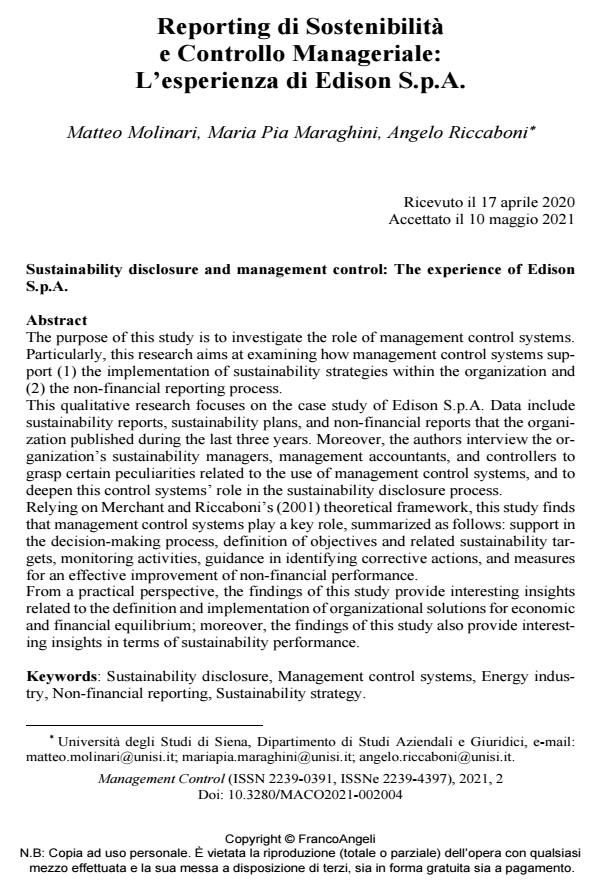Sustainability disclosure and management control: The experience of Edison S.p.A.
Journal title MANAGEMENT CONTROL
Author/s Matteo Molinari, Maria Pia Maraghini, Angelo Riccaboni
Publishing Year 2021 Issue 2021/2
Language Italian Pages 26 P. 61-86 File size 271 KB
DOI 10.3280/MACO2021-002004
DOI is like a bar code for intellectual property: to have more infomation
click here
Below, you can see the article first page
If you want to buy this article in PDF format, you can do it, following the instructions to buy download credits

FrancoAngeli is member of Publishers International Linking Association, Inc (PILA), a not-for-profit association which run the CrossRef service enabling links to and from online scholarly content.
The purpose of this study is to investigate the role of management control systems. Particularly, this research aims at examining how management control systems support (1) the implementation of sustainability strategies within the organization and (2) the non-financial reporting process. This qualitative research focuses on the case study of Edison S.p.A. Data include sustainability reports, sustainability plans, and non-financial reports that the or-ganization published during the last three years. Moreover, the authors interview the organization’s sustainability managers, management accountants, and con-trollers to grasp certain peculiarities related to the use of management control sys-tems, and to deepen this control systems’ role in the sustainability disclosure pro-cess. Relying on Merchant and Riccaboni’s (2001) theoretical framework, this study finds that management control systems play a key role, summarized as follows: support in the decision-making process, definition of objectives and related sus-tainability targets, monitoring activities, guidance in identifying corrective actions, and measures for an effective improvement of non-financial performance. From a practical perspective, the findings of this study provide interesting insights related to the definition and implementation of organizational solutions for eco-nomic and financial equilibrium; moreover, the findings of this study also provide interesting insights in terms of sustainability performance.
Keywords: Sustainability disclosure, Management control systems, Energy indus-try, Non-financial reporting, Sustainability strategy
- Sustainability reporting: How consistency and interdependence in financial and managerial accounting enhance eco‐controls Ashish Varma, Daniela Mancini, Shreya Kaushik, in Journal of Public Affairs e2910/2024
DOI: 10.1002/pa.2910 - Integrated Reporting come sistema manageriale per raggiungere obiettivi di sviluppo sostenibile: una verifica empirica Riccardo Santoni, in MANAGEMENT CONTROL 1/2023 pp.43
DOI: 10.3280/MACO2023-001003 - L'integrazione della sostenibilità ambientale nei sistemi di controllo e gestione delle imprese: evidenze dal settore energetico italiano Salvatore Madonna, Greta Cestari, Francesca Giuliani, in MANAGEMENT CONTROL 1/2024 pp.39
DOI: 10.3280/MACO2024-001003 - Integrating ESG issue into performance management system: An analysis of Italian Context Salvatore Principale, Daniela Cicchini, Luigi Andrea Carello, Rubina Michela Galeotti, in MANAGEMENT CONTROL 2/2024 pp.15
DOI: 10.3280/MACO2024-002002 - Performance management systems for sustainability in SMEs: An interventionist approach Alessandra Buonasera, Guido Noto, Carlo Vermiglio, in MANAGEMENT CONTROL 3/2024 pp.39
DOI: 10.3280/MACO2024-003003 - Environmental, Social, Governance (ESG) Antonio Leotta, Carmela Rizza, Daniela Ruggeri, Mariastella Messina, pp.759 (ISBN:978-3-031-76617-6)
Matteo Molinari, Maria Pia Maraghini, Angelo Riccaboni, Reporting di Sostenibilità e Controllo Manageriale: L’esperienza di Edison S.p.A. in "MANAGEMENT CONTROL" 2/2021, pp 61-86, DOI: 10.3280/MACO2021-002004